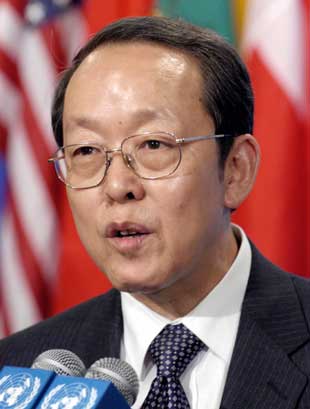UN may be close to deal on N.Korea resolution
(Reuters)
Updated: 2006-07-15 13:38
UNITED NATIONS - Japan and the United States insisted on a U.N. Security
Council vote on Saturday on a resolution condemning North Korea's barrage of
missile launches amid signs of a compromise with China.

China's Ambassador to
the United Nations Wang Guangya answers reporters' questions outside the
Security Council chambers during consultations about the situation in
North Korea at United Nations headquarters in New York July 14, 2006.
[Reuters] | After a flurry
of negotiations on Friday, Japan produced a new draft resolution that sought to
bridge the differences with China. But Beijing's ambassador said he would still
veto it unless more changes were made, which many diplomats expect when council
members resume negotiations on Saturday.
"My instructions are to get a vote by
tomorrow (Saturday)," U.S. Ambassador John Bolton told reporters. Tokyo's U.N.
ambassador, Kenzo Oshima, said, "Japan stands on the same ground."
The
key obstacle is whether the resolution should invoke Chapter 7 of the U.N.
Charter, which can lay the groundwork for military force. But China and Russia,
who on Wednesday introduced a rival draft, reject any mention of Chapter 7.
Bolton indicated he was amenable to using other language which would
make the resolution mandatory as Chapter 7 language does. But Japan's Oshima was
silent and his last draft still included Chapter 7.
Britain and France
suggested alternative wording and China's ambassador, Wang Guangya, was in
agreement and said he would check with his government, diplomats told Reuters.
U.N. Security Council members have negotiated for days over how best to
respond to North Korea's seven missile tests on July 5 that raised international
tensions, mainly because of its development of nuclear weapons.
Japan
wanted to have the resolution adopted before a summit of the Group of Eight
industrialized nations, which opened on Saturday and is expected to issue a
statement on North Korea.
But Wang said "the important thing is not the
deadline. It is the unity of the council."
"There are too many fires
there. We don't need to put oil on all those fires," he said in an apparent
reference to the Middle East crisis and debates over Iran's nuclear
ambitions.
|